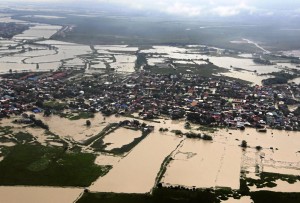Eco-lawyer: Common sense will solve floods
A system of water collection ponds in flood-prone areas has been offered as a cheap and quick alternative to the Department of Public Works and Highways (DPWH) flood-control system that is estimated to cost P352 billion.
Antonio Oposa, an environment lawyer and a Ramon Magsaysay awardee in 2009, made the suggestion before a congressional oversight committee weeks after Metro Manila and nearby provinces suffered widespread flooding as a result of heavier-than-usual rains caused by an enhanced southwest monsoon.
“Let’s do it the natural way…. [the] cheaper and the more effective way in urban areas. Let’s not build everything in concrete,” Oposa said.
At the hearing of the Joint Congressional Oversight Committee on the Clean Water Act, Senator Pia Cayetano and Laguna Representative Dan Fernandez supported the proposal to make putting up water catchment facilities a requirement for business establishments before they are given permits.
Cayetano and Fernandez, cochairs of the joint committee, welcomed the proposal amid government’s noncompliance with Republic Act No. 6716, which calls for the construction of rainwater ponds in all barangays in the country.
“I quiver when I hear the amount of money that would be spent. Hundreds of billions of pesos. Can’t we just buy property worth a million pesos or two million pesos? Buy land and dig 1,000 square meters and around it the poor could plant vegetables for food,” Oposa told the panel.
“That will arrest subsidence or reverse it,” he added. Subsidence refers to a land mass sinking due to depleted aquifers.
Massive flooding has been blamed on subsidence and on the rise of the sea level due to global warming.
The oversight panel heard Oposa and representatives of the DPWH, Metro Manila Development Authority (MMDA) and other agencies involved in the Aquino administration’s flood-control programs.
Up to 2035
A DPWH master plan for a comprehensive flood-control management in Metro Manila involves the construction of a ring-road dike on the rim of Laguna de Bay, embankments and catch basins in the Marikina River watershed and an 8-kilometer dike and pumping station in Camanava (Caloocan, Malabon, Navotas and Valenzuela) area. The program is slated to be completed by 2035.
Asked later in an interview if he was offering the water collection pond system as an alternative to the DPWH master plan, Oposa said the DPWH plan was too expensive.
“The situation is quite simple. Bring back the water to the ground,” he said.
Solution is not in billions
Oposa said P100 million would be enough to expropriate pieces of property in Metro Manila for water catchment ponds and to build retaining walls around them.
“The solution is not in billions. The solution is in common sense. Find a place for the water to go,” he said.
The water catchment ponds would have porous bottoms—lined with pebbles instead of being overlaid with concrete—so that the rain water would seep through the ground and restore aquifers.
“The water would be soaked in by the soil because it is quite dry,” he said.
The only portions of the ponds that would be made of concrete would be the walls to keep the sides from sliding.
He said the ponds, one-meter to three-meter deep, would be located in low-lying areas prone to flooding.
Vegetables, fish
Oposa said vegetable gardens could be put up around the ponds.
He also proposed that the ponds be stocked with fish so that they could provide recreational fishing.
Fernandez noted the local governments’ lack of compliance with the law requiring rainwater catchments to be put up in every barangay.
He asked the MMDA if it could compel local government units in Metro Manila to require establishments to put up water catchment facilities before they are given business permits.
Environment officer
Cayetano said there was a need to make the position of environment officer an item in the employment list of local government units.
“May I now instruct the secretariat [to study] two resolutions. One is on the environmental officer and one is on the parking and also the requirements that catchments be included [in the prerequisites] in securing business permits,” Cayetano said.
“Whether we do this by way of a recommendation to the MMDA or by bill, we’ll ask our secretariat to advise the committee,” she said.
Oposa also suggested that homes be equipped with their own small water catchment ponds.
To promote rainwater ponds, he said a property used for the catchment pond could be exempt from real estate tax.















